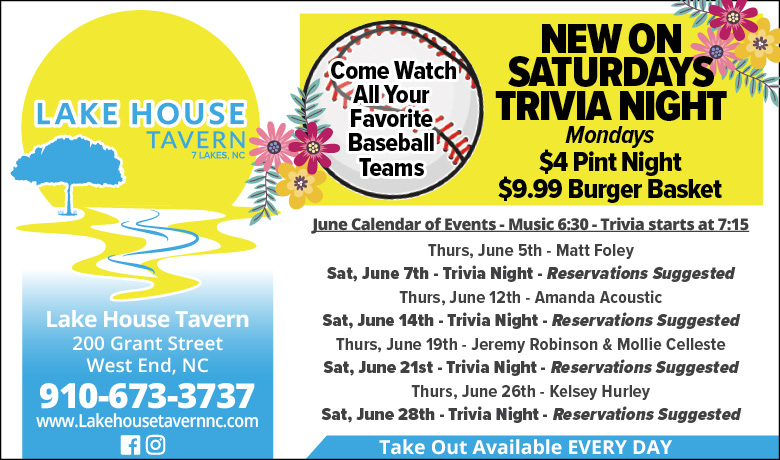BY MAGGIE BEAMGUARD, Insider Editor
A staple of most resort communities is the golf cart, and Seven Lakes North, South and West have their share. The handy vehicles zip around on treks to the golf courses, the lakes, pools, mailhouses and neighbors’ houses.
But the carts share the roads with full-size sedans, vans, trucks and plenty of construction and service vehicles, which puts them at a substantive risk for accidents.
The Seven Lakes Landowners Association (SLLA) and the Seven Lakes West Landowners Association (SLWLA) both have regulations governing golf cart use. Both communities’ policies share common ground requiring: licensed drivers, annual registration with the respective landowners associations, current liability insurance, daylight-only use without head and tail lights and safe operation, including limiting the number of passengers to the number of seats available.
But confusion sometimes arises regarding how the Seven Lakes community rules and regulations are impacted by state laws.
Two laws, passed six years apart, govern golf carts in the three communities. On March 2, 1995, the General Assembly passed House Bill 399 regarding carts within the jurisdiction of SLLA. House Bill 744, regarding SLWA, came along on May 28, 2001. Those laws say that the motor vehicle laws of the State of North Carolina and Moore County apply to all roads within the gated Seven Lakes communities.
Essentially, a violation inside the gates is the same as a violation outside them and is going to net the driver a ticket.
“Anything I can write on a street or highway in the State of North Carolina. I can also write in the gates of Seven Lakes,” said Moore County Sheriff’s Deputy Monique DiLorenzo, whose patrol area includes Seven Lakes.
The most common infraction DiLorenzo encounters with golf carts is an uderage, unlicensed driver. Other common problems she sees are carts being driven carelessly, recklessly or carrying too many people.
State law — as well as SLLA and SLWLA regulations — require that a person be at least 16 years of age and a licensed driver to operate a golf cart.
When Di Lorenzo stops a juvenile who is too young to be driving, she treats it like a real traffic stop.
“I try to give them the benefit of the doubt and say ‘If I see you again, you’re going to get cited.’ So, I’ve started keeping a document of who I’ve pulled over. I’ve started to (give) written warnings to the juveniles, because I feel like it’s a little more real to them when they actually get a warning citation.”
DiLorenzo makes sure to talk with the parents and to make them aware of the rules. “They are aiding and abetting an unlicensed driver. That’s a charge, because the child doesn’t have an operator’s license with the state of NC,” she said.
She warns parents to consider the dangers of underage drivers face.
“Even when a child first gets a license, they are very inexperienced and they have not learned how to manage divided attention,” she said.
It’s a recipe for disaster.
“These kids have no experience whatsoever. And they are just on there having fun, not paying attention, on their phones, listening to the radio, screaming. But you know, those are real roadways in there,” DiLorenzo said. “And people are driving home in regular vehicles. And maybe they’re not paying attention. And there is no protection for those kids in that golf cart. That is just a tragedy waiting to happen, and it’s definitely not worth it.”
The deputy said she modified her hours for the summer to patrol more often while kids are out of school and have more time on their hands. She believes her presence as a deterrent seems to be having an effect.
“Since I’ve been hammering down in the summer, I haven’t had too many golf cart complaints,” she said.
DiLorenzo estimates that the Sheriff’s Department annually responds to fewer than 10 complaints for underage golf-cart use. She encourages residents to let law enforcement know if there is a concern.
“Call it in to us — 911, any issues or concerns. People have a hard time with that because they feel it’s not an emergency. But let us decide what’s the emergency. Let us decide if there is a violation or how to handle it.”
For more information about golf cart use in Seven Lakes, refer to your respective association’s Rules and Regulations.
Contact Maggie Beamguard at maggie@thepilot.com.








